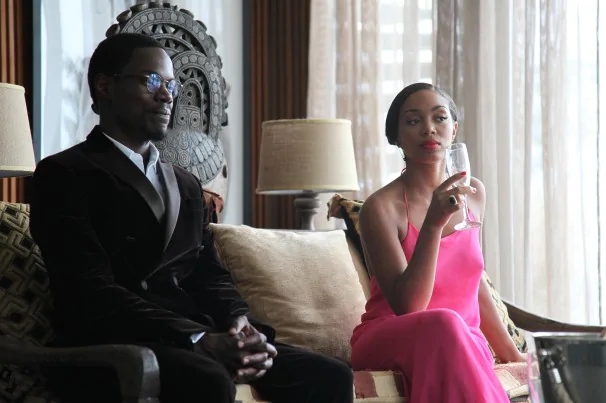Last week I talked about Ganja & Hess, Bill Gunn’s influential “black vampire movie.” This week, we’re going to talk about Spike Lee’s 2015 remake of the film, now available on Kanopy and Vudu. Da Sweet Blood of Jesus takes the basic plot of Ganja & Hess, its concerns about addiction, racial identity, and religiosity, and shifts the conversation to focus on the relationship between race, classism, and gender.

Da Sweet Blood of Jesus follows the same trajectory as the original, and even repeats scenes and dialogue. Dr. Hess Green (Stephen Tyrone Williams) is an anthropologist studying an ancient African culture (this time, it’s the Ashanti, a real empire, rather than the Myrthians) and obtains a ceremonial dagger that he puts on display in his house at Martha’s Vineyard. His unstable colleague Hightower (Elvis Nolasco) stays with him one evening and attempts to kill him with the dagger, turning Hess into a bloodthirsty not-quite-vampire. At first, Hess’s lust for blood horrifies him, but he begins to almost embrace it as a thing he cannot control, hunting down prostitutes to satisfy his cravings. His world is further upended with the arrival of Ganja (Zaraah Abrahams), Hightower’s widow, and her subsequent discovery of his sickness.
Da Sweet Blood of Jesus is more focused than Ganja & Hess, and somewhat easier to follow. Lee preserves much of the original’s curious dialogue, especially in the beginning, but further complicates it for a 2015 audience. There are questions about blood diseases—the Ashanti are plagued by anemia, and Hess at one point believes he may have contracted HIV—and the sexuality of vampirism—most of Hess’s victims are prostitutes. As with the original, Hess’s vampirism and “infection” of other people transforms into a metaphor for the distinctions of class, gender, and loss of identity. Hess displays African artifacts, images, and artwork around his home at Martha’s Vineyard almost as spoils, things that he has obtained without valuing the culture that produced. His lack of respect for the things he obtains results in his vampirism, as the power of the past comes to visit itself upon him. Even before his transformation into a vampire, Hess is distanced from those around him. He’s polite with his servants, of whom there are many, and with his assistants, but he maintains a sense of superiority. Where the original film has dialogue about assimilation, Da Sweet Blood of Jesus sets it front and center—Hess has become a colonialist of his own ancestry.
The appearance of Ganja further layers the issue of class. She’s a British woman who treats Hess’s servants with a contemptible lack of respect. But she’s a victim as well—she marries Hess, knowing he’s a vampire, and he forcibly transforms her on the wedding night. But where his attacks are almost exclusively upon black underclasses, especially prostitutes, Ganja’s sole attack is on another woman of the same relative class, represented as a seduction and union of femininity as much as an act of violation. Ganja never separates herself from her vampirism—Hess explains that he’s an addict, which he uses to set his behavior apart, as though he cannot be held accountable for it. Ganja finds power in her vampirism, but it is a power of transformation—when she discovers that her victim is still “alive,” but transformed, she wants to save her, evading Hess’s obsession with his vampirism as a death drive. Ganja begins to embrace vampirism as the creation of new life—a creation of life that doesn’t require men.
Da Sweet Blood of Jesus takes the original structure and scenes and updates them, adding another layer of dialogue to the issues presented by the original. It’s a deft move and one that few directors or writers could accomplish with such ability as Lee. While far from a perfect film, Da Sweet Blood of Jesus is a fascinating complement to Ganja & Hess and well worth a watch.
Da Sweet Blood of Jesus is available stream on Kanopy and Vudu.


